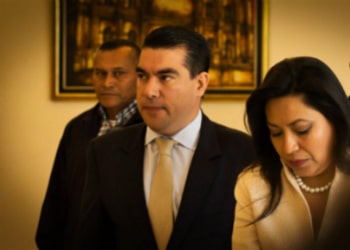El Salvador Attorney General Raúl Melara has called for evidence and witness statements to be unsealed in all corruption cases, and for such information to be made available to the public. While seemingly a move for transparency, Melara’s demand comes just after witnesses implicated his Deputy Attorney General Allan Hernández in a bribery scheme that’s already landed one former top prosecutor in jail.
A spokesman for the Attorney General’s Office said the measure is part of Melara’s anti-corruption fight. Unsealing these records, however, could expose witnesses who testified against his deputy for alleged corruption.
Salvadoran law allows for the sealing of evidence to protect victims and witnesses alike, in addition to withholding the identities of minors under the age of 18. Sealing is almost always requested by prosecutors, though there have been cases in which a judge has officially imposed such regulations. Certain portions of a case file can also be withheld from view, such as specific statements from witnesses who have received benefits in exchange for their testimony.
“The people have a right to know. I have requested that seals be lifted on all corruption-related cases,” Attorney General Melara wrote in a tweet.
SEE ALSO: El Salvador News and Profile
The majority of open corruption cases in recent years have had some or all evidence sealed and the identity of witnesses withheld at the request of the Attorney General’s Office. Such measures have proved vital in the recent embezzling cases against former presidents Antonio Saca and Mauricio Funes.
Melara’s predecessor, Douglas Meléndez, relied heavily on testimony from witnesses who received legal benefits, including immunity, in exchange for information detailing the crimes allegedly committed by the former heads of state.
The current prosecution of former Attorney General Luis Martínez for allegedly turning the prosecutor’s office into a pay-to-play shop has also required such witness information. In that case, Deputy Attorney General Hernández has been accused by two officials who say that he received cash from prominent businessman Enrique Rais. Rais is accused of bribing members of the Attorney General’s Office in order to be favored in legal proceedings initiated by him or against him.
InSight Crime Analysis
It’s still unclear what Melara’s motives are for unsealing the information on all of the country’s corruption cases, primarily because he hasn’t thoroughly explained them.
Eliminating the sealing of evidence in corruption cases can indeed reveal more details about the scope of corruption in El Salvador, and expose public officials who have provided information about their own involvement in corruption while working under the protection of two former presidents. But unsealing can also ruin ongoing investigations, as Melara well knows.
SEE ALSO: InDepth Coverage of Elites and Organized Crime
For example, the case against former Attorney General Martínez is based to a large extent on witnesses who had a minor role in the corruption scheme and have agreed to disclose what they know in exchange for reduced sentences, or even to avoid being charged at all.
After calling for the unsealing of corruption evidence, Melara has not said whether he will attempt to prosecute people who have received benefits in exchange for their testimony.
It is also unclear if he will open investigations into any officials whose names come up in testimony. This includes his deputy attorney general, Allan Hernández, whom he has defended in public despite the fact that at least two witnesses and official documents allegedly link Hernández to past corruption networks within the prosecutor’s office.

